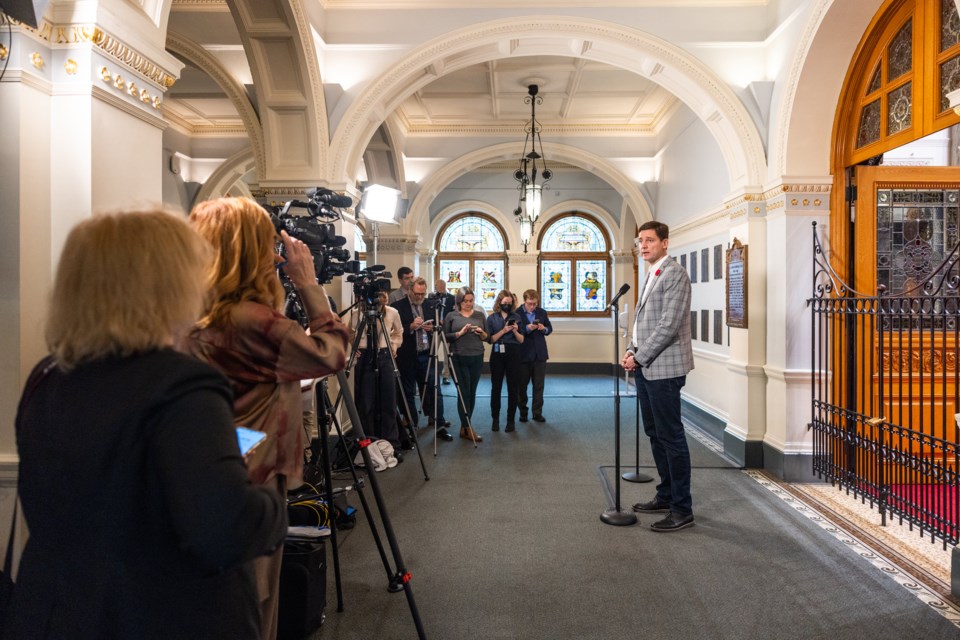The dust has finally settled, and it’s official: the NDP will once again form a majority government in British Columbia, slim though the margins may be.
Putting aside the fact this instalment of Opening Remarks was written prior to Tuesday’s U.S. election (which represents an entirely different set of what-ifs), what might the B.C. election mean for business and tourism in the province?
The BC Chamber of Commerce and other provincial business associations wasted little time weighing in, issuing a public letter Oct. 30 urging all of B.C.’s new elected representatives to work together to improve the economy.
“The province has lost 12,400 manufacturing jobs since 2017, and the lack of investment in the sector is ‘nearing crisis levels,’ according to the Canadian Manufacturers and Exporters,” the letter read, in part.
“Forestry has shed over 10,000 direct jobs in just four years and hundreds of millions of dollars of lost investment. Zooming out, B.C. has seen effectively no growth in private sector employment growth between 2019 and 2023. This is unprecedented and unsustainable.”
The letter pointed to the $7.9 billion operating deficit projected in B.C.’s most recent budget, and highlighted some of the very expensive promises floated by all parties in the recent campaign.
“Overall, B.C.’s fiscal and economic trajectory is deeply concerning. As you shape the next government and plan your work in the upcoming legislative sessions, we urge you to give serious consideration to the state of B.C.’s economy,” it read.
“We live in a province that has all the building blocks necessary to support a strong economy: an abundance of resources, a well-educated and skilled workforce, and a reputation for stability, and the rule of law. From cutting-edge technologies and innovations to the natural resources needed to create them, British Columbia has the assets that position us as a leader in the global economy.”
Where does tourism fit into the puzzle?
According to Walt Judas, CEO of the Tourism Industry Association of BC (TIABC), stats presented at the recent Thompson Okanagan Tourism Association Summit show tourism is bouncing back internationally.
“Year-over-year growth is roughly four per cent, which is down from the average annual growth rate of seven per cent between 1950 and the start of the pandemic, but is nonetheless a good sign,” Judas said in a Nov. 1 TIABC newsletter, adding 2024 “will realize a staggering 1.1 billion international arrivals.
“And while domestic travel led the way after COVID, international travel is surging but not yet back to 2019 levels, largely because airline seat capacity is still catching up,” Judas said.
B.C.’s newest government would be wise to keep investing in tourism.
According to Tourism Whistler, the industry is one of the top drivers of British Columbia’s economy, generating $18.5 billion annually and $7.2 billion in GDP, contributing more than $2 billion in provincial and municipal taxes, and consisting of more than 150,000 jobs (according to 2022 provincial stats).
As has been the case across the board, inflation and higher interest rates have meant increased costs for tourism businesses, in turn putting pressure on pricing.
“Canada’s GDP growth is currently hovering at a modest one per cent, below the projected two-per-cent inflation, so interest rates may come down even further to stimulate the Canadian economy,” said TW president and CEO Barrett Fisher in an email. “The good news for tourism is that Canada/B.C./Whistler will remain affordable to the U.S. market, whose economy is comparatively buoyant, and whose exchange rate is currently hovering around $1.40 CDN, and it may encourage Canadians to stay closer to home.”
That said, tourism needs ongoing investment, and some necessary provincial support TW identified includes: Ensuring taxation levels remain competitive and affordable for businesses; ensuring B.C.’s MRDT is protected for tourism to stimulate consistent and long-term tourism experiences and visitor demand; providing stimulus funds for communities to invest into festivals and events that drive visitation in need periods; providing stimulus funds for communities to invest in weather-independent tourism infrastructure (like attractions, or conference centres) to support year-round viability; and providing housing grants for affordable employee housing projects that directly benefit tourism workers.
“Other issues requiring government support fall into the federal government’s jurisdiction, such as removing the Underused Housing Tax from tourist-zoned accommodations, as these properties are zoned for tourist usage, not residential usage; and supporting the tourism industry with foreign worker programs, such as the Post-Graduate Work Permit program, to which the fed government just announced that hospitality and restaurant operations will no longer be included in the eligibility list for graduating international students, substantially reducing the flow of trained professionals who can work in the tourism industry,” Fisher said.
From the Whistler Chamber’s perspective, the key issues facing businesses are both economic and social, said executive director Louise Walker.
“The accumulation of costs—supplies, labour, rent, property tax, employer health tax, etc.—is a huge burden for businesses, many of whom operate with small margins,” Walker said in an email, adding the Chamber looks forward to working with MLA Jeremy Valeriote and the government to advocate for increased affordability, workforce development and business-friendly policies.
“The provincial government can support local businesses by helping to create more affordable housing, funding regional transit and developing programs and policies that grow the economy, all of which in turn supports people and communities,” she said.
Here’s hoping tourism lands high on the list of priorities for B.C.’s next government.




